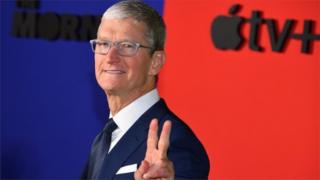Apple accused of ‘hostile’ app fee policies
 Image copyright Getty Images
Image copyright Getty Images Apple is facing mounting calls to reconsider its App Store rules, from the creators of the apps themselves.
Dozens have used the term «hostile» to describe how they perceive it treats its third-party developer community.
The backlash has been sparked by a row between the tech giant and the makers of a new email app over a demand that Apple be given the means to take a cut of the services’s subscription fee.
The clash threatens to overshadow one of Apple’s biggest annual events.
The iPhone-maker hosts its annual Worldwide Developers Conference (WWDC) on Monday. The five-day event is used to showcase new technologies and encourage software-makers to adopt them.
Regulators and politicians have also questioned whether Apple is behaving illegally.
On Tuesday, the European Union launched a formal probe into the firm’s App store rules saying it believed they might be «distorting competition» in the digital goods market.
And in the US, Congress is waiting to hear whether chief executive Tim Cook will testify to a House committee investigating whether Apple, Facebook, Google and Amazon are exploiting their size to obtain unfair advantages over smaller companies.
Mr Cook has previously said that he thought it was fair for Apple to come under scrutiny, but the firm was not a monopoly in any of the markets it operated in.
‘Perversely abusive’
The dispute – with the Chicago-based software firm Basecamp – began on Monday when Apple rejected an update to its Hey app.
Hey screens emails and separates them into different places, so that users can focus on the most important ones.
It offers an alternative to Apple’s own Mail app as well as other services such as Gmail and Outlook.
It costs $99 (£87) a year. This fee must be paid for via Hey’s own site, but the app does not contain links or other prompts to do so.
Even so, Apple told Basecamp it must also offer an in-app payment option, from which the App Store owner would deduct a 30% cut.
Apple added that the original version of the app should not have been approved in the first place.
Basecamp’s chief technology officer has tweeted his dismay, accusing Apple of a «shakedown» and being «perversely abusive and unfair».
«I will burn this house down myself, before I let gangsters like that spin it for spoils,» David Heinemeier Hansson added.
The executive testified to Congress earlier this year when he complained about Apple’s commission charges, at which time he was also critical of Google’s business practices.
However, he has noted in this latest dispute that Google’s Play Store is not trying to impose a similar revenue share.
His tweets have struck a nerve with other developers, some of whom have used the opportunity to express their own concerns.
Several major players have also been critical.
Video game Fortnite’s chief Tim Sweeney, Tinder’s owner Match Group, and Spotify’s chief legal officer all issued statements to the Washington Post, pressing Apple for a rethink.
For its part, Apple notes that policies in place since 2010 made clear that paid services must offer users the option to make the purchase within the app.
The firm does make an exception for what it terms Reader apps – including magazines, books, newspapers, video-streamers and cloud storage – so long as they do not directly tell users to pay elsewhere.
This is why Amazon’s Kindle app, for example, lets iPhone-owners read books bought off the retailer’s site, but does not direct them to buy other titles from there.
Apple has given some organisations further special dispensation – for example BBC’s iPlayer app tells users they must pay the licence fee, but does not provide the US firm with a way of taking a cut.
But otherwise, Apple says developers must follow its «strict guidelines».
Uninformed consumers
Mr Hansson, however, claims that Apple recently tightened the application of its rules, which would explain why some other apps appear to have escaped the in-app fee requirement. But Apple has said there has been no change of practice.
Apple’s model offers users convenience, but one company-watcher said it could also place them at a disadvantage, as they cannot be told it might be cheaper to sign up outside the app.
«It’s increasingly difficult for customers to understand all the different options open to them when subscribing to content, particularly through Apple’s App Store, because developers aren’t able to display all the deals available to them,» explained Ben Wood from the consultancy CCS Insight.
«And there is little question that this debate has now exploded into the public domain.
«Therefore it’s going to be interesting to see whether it’s something that Apple addresses at WWDC.»

